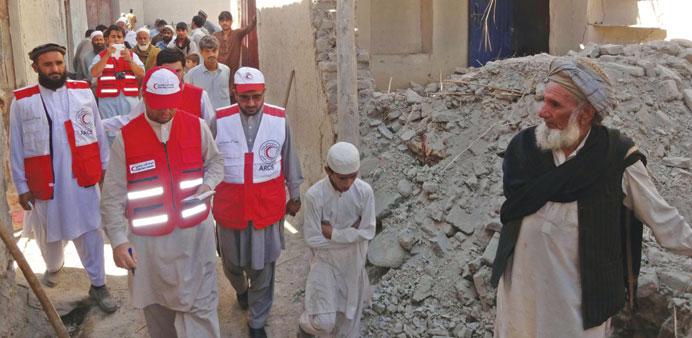Qatar Red Crescent Society (QRCS) has issued an emergency appeal to raise QR7mn (nearly $1.9mn) for urgent assistance in healthcare, shelter, food and nonfood aid, as well as water and sanitation, for victims of the recent
Afghanistan earthquake.
The six-month relief programme is targeting 125,000 victims, the organisation said in a statement.
QRCS said it was the first humanitarian organisation to respond immediately after the 7.5-magnitude earthquake hit Afghanistan and affected Pakistan and India. Within one hour of the disaster, the Disaster Management Information Centre was convened to monitor the situation.
QRCS allocated $375,000 from its Emergency Response Fund to launch an urgent intervention there, the statement noted.
At a cost of $1,350,000 over six months, 6,000 families (42,000 people) will receive tarpaulins, blankets, mattresses, winter clothes, lambs, kitchenware and water tanks. Also, 400 destroyed houses will be rebuilt.
QRCS teams will provide 2,600 families (18,300 people) with one-month food packages to meet their needs and reduce malnutrition. The food packages will be purchased from the local market at a cost of $170,000 and distributed over a month.
The relief plan also involves offering primary healthcare to protect the community against contagious diseases, supporting secondary healthcare facilities with medicines and medical consumables bought from the local market, and sending mobile emergency clinics in co-ordination with the International Committee of the Red Cross. This part of the plan will serve 15,000 people over two months at a cost of $100,000.
To ensure the availability of sources of potable water and improve personal hygiene, QRCS will build toilets, launch awareness campaigns, distribute hygiene kits and provide clean water to 50,000 people. This will cost $297,808 and last for three months.
QRCS’s mission in Afghanistan has sent teams to assess the situation on the ground in co-ordination with the Afghan Red Crescent Society. Humanitarian assistance has been distributed to 4,030 beneficiaries in Badakhshan and 3,950 beneficiaries in Nangarhar, Kunar, Nuristan, and Laghman.

QRCS staff assessing the damage.
